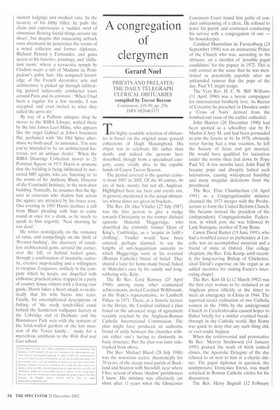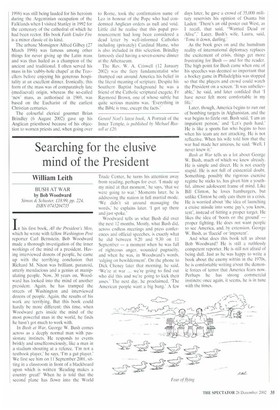A congregation of clergymen
Gerard Noel
PRIESTS AND PRELATES: THE DAILY TELEGRAPH CLERICAL OBITUARIES compiled by Trevor Beeson Continuum, £16.99, pp. 256. ISBN 0826463371 his highly readable selection of obituaries is based on the original more general collections of Hugh Massingberd. His object was to celebrate life rather than death; and indeed the persons here described, though from a specialised category, come vividly alive in the capable hands of Canon Trevor Beeson.
The period covered is the quarter century from 1987 to 2002. Of the 89 entries, 86 are of men, mostly, but not all, Anglican. Highlighted here are facts and events not, in general, mentioned in the actual obituaries, whose dates are given in brackets.
The Rev. Dr Alec Vindler (27 July 1987) was the first person to give a nudge towards Christianity to the former diehard agnostic Malcolm Muggeridge, who described the erstwhile former Dean of King's, Cambridge, as a 'sceptic in faith's clothing'. Vindler would have been amazed, perhaps alarmed, to see the lengths of sub-Augustinian austerity to which Muggeridge went in his eventual (Roman Catholic) brand of belief. They shared a taste for home-made bread, baked in Malcolm's case by his saintly and longsuffering wife, Kitty.
The Rt Rev. Lord Ramsey (25 April 1988), among many other ecumenical achievements, invited Cardinal Willibrands, as the Pope's representative, to Lambeth Palace in 1971. There, at a historic lecture in the library, the Cardinal outlined a plan based on the advanced stage of agreement recently reached by the Anglican-Roman Catholic International Commission. The plan might have produced an authentic brand of unity between the churches without either one's having to dismantle its basic structure. But the plan was later sidetracked from above.
The Rev. Michael Bland (28 July 1988) was the notorious rector, theoretically for 30 years, of the sleepy rural parish of Buckland and Stanton with Snowhill, near where I live, several of whose 'shadow' parishioners I knew. His ministry was effectively cut short after 11 years when the Gloucester
Consistory Court found him guilty of conduct unbecoming of a cleric. He refused to leave his parish and continued conducting his service with a congregation of one — his housekeeper.
Cardinal Maximilian de Furstenburg (24 September 1998) was an aristocratic Prince of the Church who was, according to his obituary, on a shortlist of 'possible papal candidates' for the papacy in 1972. This is only correct in the sense that he was mentioned as potentially papabile after an unfounded rumour that the pope of the day, Paul VI, might resign.
The Very Rev. H. C. N. 'Bill' Williams (11 April 1990) was a heroic campaigner for international brotherly love. As Rector of Coventry he preached in Dresden under a 'Cross of Nails' derived from the bombed-out ruins of the earlier cathedral.
John Harriot (28 December 1990) had been spotted as a schoolboy star by Fr Martin d'Arcy SJ, and had been persuaded to join the Jesuits at 16. In 1978, obviously never having had a true vocation, he left the Society of Jesus and got married. He would have qualified for laicisation under the norms then laid down by Pope Paul VI. A few months later, John Paul 11 became pope and abruptly halted such laicisations, causing widespread hardship and many irregular defections from the priesthood.
The Rev. Elsie Chamberlain (16 April 1991) as a Congregationalist minister shunned the 1973 merger with the Presbyterians to form the United Reform Church. She became instead the president of the (independent) Congregationalist Federation, in which post she was followed by Lady Stansgate, mother of Tony Benn.
Canon David Rutter (19 June 1991), who had a troubled career as prebendary at Lincoln, was an accomplished musician and a friend of mine at Oxford. Our college chaplain, the Rev, Eric Kemp, until recently the long-serving Bishop of Chichester, cited David's expertise on the organ as an added incentive for visiting Exeter's interesting chapel.
The Rev. Kim Oi Li (2 March 1992) was the first ever woman to be ordained as an Anglican priest (illicitly at the time) to meet an emergency in China in 1944. The reported secret ordination of two Catholic women in the 1980s by the underground Church in Czechoslovakia caused hopes to flicker briefly for a similar eventual breakthrough in the Catholic world. But Rome was quick to deny that any such thing did, or ever could, happen.
When the controversial and provocative Rt Rev. Mervyn Stockwood (14 January 1995) praised the work of birth control clinics, the Apostolic Delegate of the day refused to sit next to him at a charity dinner. The papal diplomat in question, the unimpressive Domenico Enrici, was much criticised in Roman Catholic circles for his discourtesy.
The Rev. Harry Bagnall (12 February 1998) was still being lauded for his heroism during the Argentinian occupation of the Falklands when I visited Stanley in 1992 for the centenary of the cathedral of which he had been rector. His book Faith Under Fire is a minor classic of its kind.
The urbane Monsignor Alfred Gilbey (27 March 1998) was famous among other things for never giving up the Latin mass and was thus hailed as a champion of the ancient and traditional. I often served his mass in his 'cubby-hole chapel' at the Travellers before enjoying his generous hospitality at an excellent dinner. Ironically, this form of the mass was of comparatively late (mediaeval) origin, whereas the so-called 'new' mass, as authorised in 1969, was based on the Eucharist of the earliest Christian centuries.
The colourful clerical gourmet Brian Brindley (6 August 2002) gave up his Anglican priesthood because of his objection to women priests and, when going over to Rome, took the confirmation name of Leo in honour of the Pope who had condemned Anglican orders as null and void. Little did he realise that this papal pronouncement had lone, been considered a dead letter by well-informed Catholics including (privately) Cardinal Hume, who is also included in this selection. Brindley famously died having a seven-course dinner at the Athenaeum.
The Rev. W. A. Criswell (12 January 2002) was the fiery fundamentalist who thumped out around America his belief in the literal meaning of scripture. Despite his Southern Baptist background he was a friend of the Catholic scriptural exegete, Fr Raymond Brown, one of whose subtle but quite serious maxims was, 'Everything in the Bible is true, except the facts.'
Gerard Noel's latest book, A Portrait of the Inner Temple, is published by Michael Russell at £20.



























































 Previous page
Previous page